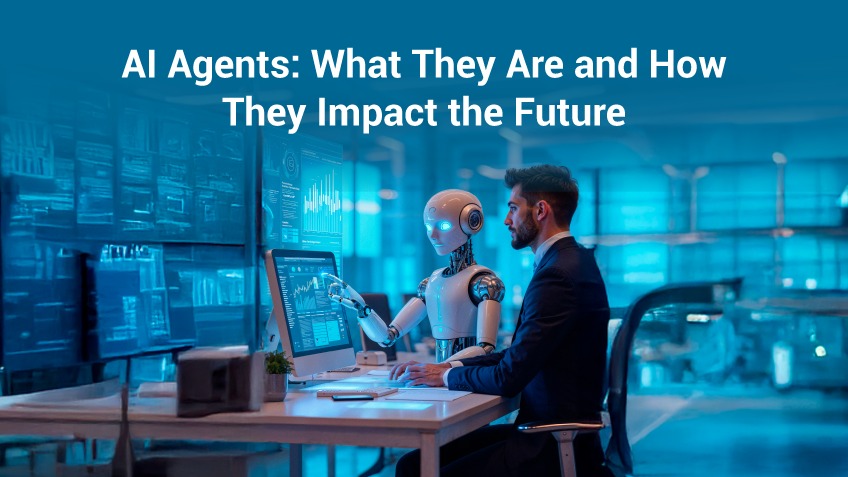Think of a situation—it’s Monday morning, and you have lots of tasks to complete. Juggling between tasks is something that most of us don’t prefer, and mostly, it doesn’t give the desired results. The quality of work gets hampered because of time constraints. So, what’s the solution when you have to meet all ends single-handedly? A short answer—AI agents.
Even a few years back, we thought of AI agents as the stuff of sci-fi. With advanced AI development, things have changed profoundly in recent times, and for all good reasons. Artificial intelligence powers these agents, and they shape how we perform tasks and automate many of these tasks for your convenience. They execute tasks flawlessly and quickly, which is impossible for humans.
Leading AI development companies are continuously innovating to enhance these agents’ capabilities, making them smarter, more efficient, and increasingly versatile across various industries. It’s expected that the impact of AI agents in the upcoming years will be more significant.
AI Agents: A Brief Note
An AI agent is a program or system that can execute tasks on behalf of users or another system. These software-based systems are powered by LLMs (Large Language Models). They evaluate the physical and digital environments and, thereafter, process information, make decisions, and initiate actions to attain the objectives.
Types of AI Agents
AI agents can be of different types, but the noteworthy aspect is that each of these agent types has unique features. Have a look:
- Simple Reflex Agents: This basic AI agent functions on condition-action guidelines based on the present state of the physical and digital environment.
Example: A thermostat that adjusts the heating according to the current temperature. - Goal-Based Agents: Unlike Simple Reflex Agents, they are more intelligent and consider the consequences of their actions in accordance with their environment.
Example: A robot vacuum cleaner that cleans an entire property but avoids areas with wet floors. - Model-Based Reflex Agents: A trait of this AI agent type is that it blends an internal model of the world with real-time observations. Here, the purpose is to make informed decisions.
Example: A self-driving car that uses sensors and mapping data while moving through the streets. - Utility-Based Agents: As the name suggests, these agents arrive at a conclusion based on a utility function. To be precise, this function calculates the satisfaction level or utility associated with possible outcomes.
Example: A smart home system adjusts lighting, heating, and cooling based on present energy charges, outdoor weather, room occupancy, and user comfort preferences. - Learning Agents: These agents continuously evolve by learning from feedback. They are versatile since learning agents are capable of modifying their behavior, knowledge, and models by interacting with the immediate environment.
Example: A personalized movie recommendation system that suggests new movies to users based on their watching habits, likes, and skips.
Business Benefits of AI Agents
Utilizing AI agents for running a business is a good approach because of these multiple benefits:
Automation of Mundane Tasks
It’s a natural tendency for humans to get bored when they perform the same functions over again. At times, executing these tasks can also be time-consuming. By using machine learning agents, these issues can be fixed effectively. In that case, you don’t have to deal with mundane tasks that are also not very important. It gives you the scope to concentrate on the creative and strategic aspects that add more value to your business.
Better Quality Output and Increased Productivity
Research highlights that two out of three customers are annoyed when customer service professionals aren’t able to fix their concerns properly. Yes, inconsistencies and errors while delivering any kind of service are natural phenomena when the task is performed by human workers. If you hand over certain functions to AI agents, it will be easier for you to maintain accuracy and consistency in areas like data analysis, quality control, and documentation.
Apart from generating quality output, AI agents also excel in productivity. Unlike humans, they don’t suffer from exhaustion and can execute several tasks within a short period. This is something unattainable for humans.
Minimizes Operational Costs
If you resort to machine learning agents to perform certain business functions, the need for manual labor will naturally decrease. It’s a great way to cut down expenses and avoid costly rectifications.
Facilitates Real-Time Decision-Making
AI agents are excellent at scrutinizing extensive datasets in real-time. They give instant insights and inform agile decision-making. It helps businesses to gain an edge over their competitors and thrive in this fast-paced world.
The Future of AI Agents
It’s already the age of agentic AI, and going forward, these agents will become more intelligent. In 2025, they are already impacting several industries—finance, retail, manufacturing, etc., and their influence will be bigger than ever in the future.
According to a market study, it’s anticipated that the AI agents market will escalate from USD 7.84 billion in 2025 to USD 52.62 billion by 2030 at a CAGR of 46.3%.
The future of work with AI agents is indeed encouraging because of the benefits mentioned in the above section. Let’s explore what the future has in store for us:
Agents Working With Agents
In the coming years, multi-agent systems will gain all the limelight. The days of single-agent AI applications like service or sales are over. So, what benefits do the multi-agent systems bring? Well, they can tackle complex challenges, such as creating marketing campaigns that single-agent applications weren’t capable of. A unique feature of these systems is that they coordinate with one another, adapt, and execute while fixing difficult organizational issues.
AI Agents in the Workforce
Though the battle of AI vs human intelligence is never-ending, it’s a fact that both of them have unique characteristics. They complement each other when used correctly. In the future, companies will onboard AI agents and make them a part of their workforce. It’s expected that these agents will work with humans toward a common goal.
Needless to say, AI agents will release the burden from human workers by taking up complex and boring jobs that most individuals find increasingly difficult to accomplish. More often, because of these functions, the high-impact tasks get little attention. AI agents will enable the workers to focus on more strategic roles and critical business operations. With this human-AI collaboration, businesses can increase their productivity, make better decisions, and elevate customer experience while simultaneously focusing on innovation.
One clear example of this transformation is in sports coaching. Platforms like Cycling Coach AI use intelligent agents to create personalized cycling training plans for cyclists, adapting each week based on real performance and availability. These systems allow athletes to focus on execution and recovery, while the AI handles the complexity of data analysis and continuous plan optimization
Ethical Considerations
There are manifold benefits of utilizing machine learning agents, but there are also a few ethical considerations. Certain discrepancies are likely to arise when humans work with AI agents, and regulations are necessary to prevent them. AI agents need to work transparently and align with human values. If it’s not, the law needs to be implemented. This is particularly necessary in sectors like healthcare and finance.
Final Words
The potential of AI agents is huge, and the ways they are reshaping industries are more than ever imagined. AI agents are super proficient in doing almost anything, whether it’s task automation, decision-making, or user experience optimization. With the evolution of AI technology, we can expect these agents to become more intelligent and efficient.
The future of these agents doesn’t revolve around automation but extends beyond this aspect. Human-AI collaboration will be the new norm since these agents augment human capabilities. Yes, the future is promising when it comes to our lives and work, but everything comes with downsides. Ethical considerations are there for which the development of these agents must be handled with caution and responsibility.
FAQs
1. What’s the impact of AI agents on businesses?
AI agents are adept at addressing irregular, multistep problems and coming up with effective solutions. With these advanced abilities, they automate complex business operations, and for the above reasons, their use cases are also expansive.
2. How do AI agents perceive their environment?
It’s through sensors that AI agents interact with their environment. The function of these sensors is to gather data. After data collection, it’s up to the perceivers to analyze and interpret that data. The agent utilizes this data to make important decisions and initiate actions.
3. What are the various types of AI agents?
AI agents can be of various types, such as Simple Reflex Agents, Goal-Based Agents, Model-Based Reflex Agents, Utility-Based Agents, and Learning Agents. These categories are made based on how the AI agent interacts with its immediate environment, makes decisions, and learns over time.
4. Which sectors will benefit the most from AI agents?
AI agents will have a profound impact on industries like healthcare, finance, manufacturing, retail, etc. They can automate essential and routine business processes, increase productivity, and help in decision-making.
5. Will AI agents replace human jobs?
In fact, AI agents will automate certain tasks, but at the same time, they will also create new avenues for human workers to explore. There is a high probability that humans will work with AI agents to get the job done correctly.

































